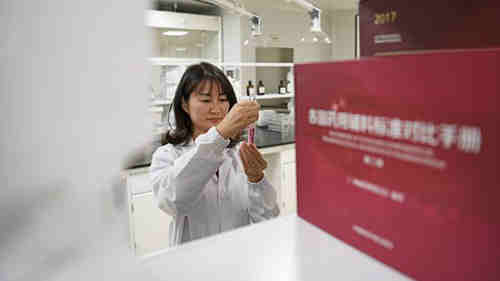
Technology
19:58, 22-Apr-2019
China's draft civil code focuses on regulating embryo-related studies, protecting privacy
CGTN

China is considering regulating studies related to human genes or embryos in the draft section of personality rights of the civil code, which was submitted to the top legislature for review on Saturday.
Those who conduct medical or scientific studies related to human genes or embryos shall abide by laws, administrative rules and relevant regulations, the draft says, adding that people's health should not be harmed, nor ethical and moral standards violated.
The move marks the first time China has made a fundamental regulation concerning such issues in civil legislation.
The clause was added to the draft section of personality rights of the civil code for its second reading at the Standing Committee of the National People's Congress, which is in its bimonthly session.
Wang Liming, a law professor at Renmin University of China (RUC), said the legislation was necessary for the healthy and orderly development of research under the guidance of science and ethics.
The draft also strengthens protection for those taking part in clinical trials for the research of new drugs, medical equipment, and treatments.
Approval must be secured from both administrative authorities and ethical committees, the draft says, adding that participants or their custodians must be informed with the written agreement of the trial purpose, application, and risks.
"Humans cannot be reduced to guinea pigs," said Meng Qiang, a law professor at Beijing Institute of Technology. "Strict procedure and especially the approval from the ethical committee is very important."
On personal rights, the draft stipulates that no organization or individual should use information technology to infringe upon others' image through forging. This also applies to the authorized use of other personal rights and the protection of a person's voice.
"This technology can easily be misused," Meng said. "Addressing the issue, this piece of fundamental civil legislation demonstrates its attitude of protecting citizens."
"It is necessary to emphasize regulation of medical or scientific studies related to human genetic information in the civil code, which is considered the most fundamental privacy for all citizens," said Liu Changqiu, a health law expert and research fellow at the Shanghai Academy of Social Sciences.
Collection of personal information from people without a capacity for civil conduct, including the underage people, as well as people with limited capacity for civil conduct, should obtain consent from the natural person or custodian, according to the draft section.
Underage people are not mentally mature, and their privacy and personal information are easily subject to infringement, said Wang.
The draft section also stipulates government authorities and staff members should keep secret privacy and personal information that they know when fulfilling responsibilities.
Protection of personal information is being strengthened, particularly the minors.
The draft section stipulates that collection of personal information from minors should obtain consent from the person or the custodians.
"The privacy of minors is an easy subject of infringement," said Wang, the law professor. "Regulation on information collection, like consent from the custodians, is very necessary."
Yang Lixin, another law professor at RUC, said the stipulation has laid a good foundation for formulating a personal information protection law in the future.
Source(s): Xinhua News Agency
,Global Times

SITEMAP
Copyright © 2018 CGTN. Beijing ICP prepared NO.16065310-3
Copyright © 2018 CGTN. Beijing ICP prepared NO.16065310-3